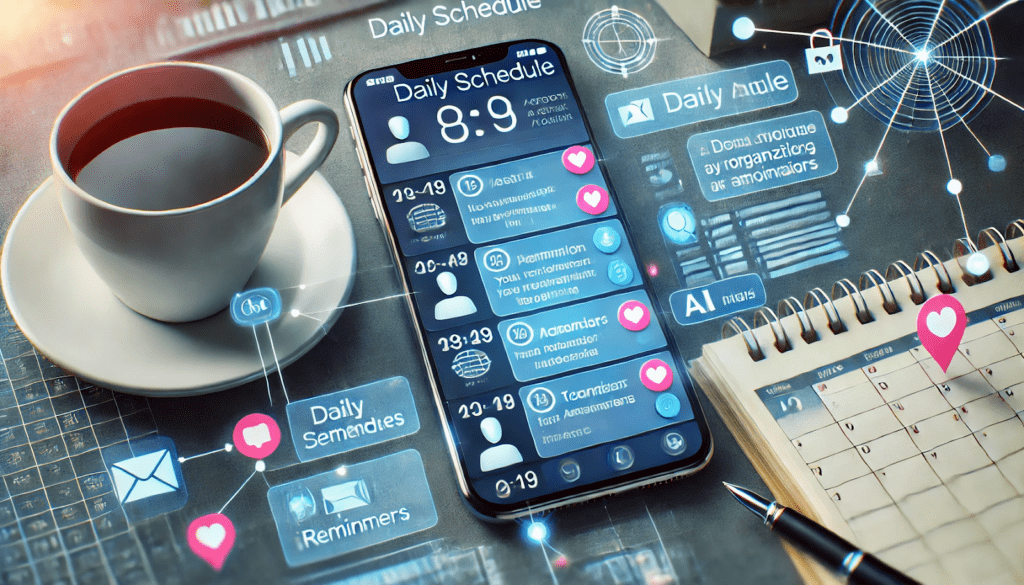Introduction
In the fast-paced world we live in today, effective time management is crucial for success and well-being. Traditional time management tools, such as calendars and to-do lists, have evolved significantly with the advent of technology. Now, Artificial Intelligence (AI) is revolutionizing the way we manage our time, providing innovative solutions that enhance productivity and efficiency. This article explores how AI is transforming time management, helping individuals and businesses plan their days more effectively.
Section 1: Understanding AI in Time Management
What is AI in Time Management? AI in time management involves using advanced algorithms and machine learning to optimize the way we plan, schedule, and execute our daily tasks. These AI-powered tools analyze patterns in our behavior, predict future needs, and provide personalized recommendations to improve productivity. For instance, AI can automate scheduling by finding the best times for meetings, reminders for deadlines, and even suggest optimal breaks for maintaining productivity.
The Evolution of Time Management Tools Time management tools have come a long way from simple paper planners to sophisticated digital solutions. The introduction of AI has taken this evolution a step further by integrating smart assistants, automated scheduling, and predictive analytics. Tools like Google Calendar and Microsoft Outlook now incorporate AI features that streamline scheduling and task management, making them more intuitive and user-friendly.
Section 2: Key AI Tools Enhancing Time Management
Smart Assistants AI-powered smart assistants like Siri, Google Assistant, and Alexa are transforming the way we manage our time. These virtual assistants can set reminders, schedule appointments, and even provide daily briefings on upcoming tasks and events. By understanding natural language and learning from user interactions, these assistants offer a personalized time management experience. For more details, you can visit Google Assistant’s official page.

Automated Scheduling Automated scheduling tools, such as Clara and x.ai, use AI to manage meeting requests and appointments. These tools can interact with participants via email to find mutually available times, reducing the back-and-forth typically associated with scheduling meetings. They can also handle cancellations and rescheduling, ensuring that your calendar remains up-to-date and conflict-free.
Predictive Analytics AI leverages predictive analytics to provide insights into how you spend your time and suggest improvements. Tools like RescueTime and Time Doctor analyze your work habits, track time spent on various tasks, and generate reports highlighting productivity trends. These insights help you identify time-wasting activities and optimize your schedule for better efficiency. Learn more about predictive analytics in time management on RescueTime’s website.
Section 3: Benefits of AI in Time Management
Increased Productivity AI tools help increase productivity by automating repetitive tasks and providing smart recommendations. By handling mundane tasks, AI allows you to focus on high-priority activities, ensuring that your time is spent on what truly matters. This automation reduces the cognitive load, allowing for more strategic and creative thinking.
Personalized Experience AI-powered time management tools offer a personalized experience tailored to your habits and preferences. By learning from your behavior, these tools can suggest optimal times for activities, recommend breaks, and even remind you to step away from your desk for a bit of exercise. This personalization ensures that your time management strategy aligns with your unique workflow and lifestyle.
Enhanced Decision-Making With AI analyzing your time usage and productivity patterns, you can make more informed decisions about how to allocate your time. These insights help you prioritize tasks, set realistic goals, and maintain a balanced schedule. The data-driven approach provided by AI ensures that your decisions are backed by accurate and relevant information.
Section 4: Real-World Applications and Case Studies
Corporate Use of AI in Time Management Many corporations are adopting AI to enhance employee productivity and streamline operations. For example, IBM uses AI to manage employee schedules, optimize workflows, and improve project management efficiency. By integrating AI into their time management processes, companies can achieve significant gains in productivity and employee satisfaction. More information on IBM’s AI initiatives can be found on their official website.

Individual Success Stories Individuals across various fields are leveraging AI to improve their time management. Entrepreneurs use AI tools to balance their busy schedules, ensuring that they allocate sufficient time for strategic planning, networking, and personal development. Freelancers and remote workers also benefit from AI by managing their work hours more effectively, avoiding burnout, and maintaining a healthy work-life balance.
Conclusion
AI is revolutionizing time management by providing innovative solutions that enhance productivity, efficiency, and decision-making. From smart assistants and automated scheduling to predictive analytics, AI-powered tools offer personalized and intelligent time management strategies. By embracing these technologies, individuals and businesses can optimize their daily routines, achieve their goals, and maintain a balanced lifestyle. As AI continues to evolve, its impact on time management will only grow, making it an indispensable tool for navigating the complexities of modern life.
FAQs
1. How can AI improve my time management skills?
AI improves time management by automating repetitive tasks, scheduling meetings, providing personalized reminders, and offering insights into how you spend your time. Tools like smart assistants and predictive analytics help you prioritize tasks and maintain a balanced schedule. Learn more about AI’s role in time management on the Google Assistant website.
2. What are some popular AI tools for time management?
Popular AI tools for time management include smart assistants like Google Assistant and Siri, automated scheduling tools like Clara and x.ai, and productivity analytics tools like RescueTime and Time Doctor. These tools help streamline scheduling, track time usage, and provide personalized recommendations to enhance productivity.
3. Can AI help reduce work-related stress?
Yes, AI can help reduce work-related stress by automating tedious tasks, providing reminders to take breaks, and offering insights into better work habits. By optimizing your schedule and reducing the cognitive load, AI helps maintain a healthier work-life balance. For more on this, visit Rescuhttps://www.rescuetime.com/eTime’s website.
4. How does AI learn to personalize my time management?
AI personalizes your time management by analyzing your behavior, preferences, and routines. Through machine learning algorithms, AI tools learn from your interactions, track your habits, and provide tailored recommendations that align with your unique workflow and lifestyle. For detailed insights, check out IBM’s AI initiatives.
